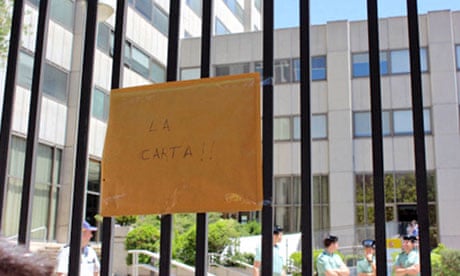From the open letter by astrophysicist Amaya Moro-Martín to the Spanish prime minister, published in El País on 19 August 2013 (the English version published in The Guardian 28 August 2013):
Afortunadamente España lidera la cruzada de las homologaciones. Fuera de nuestras fronteras cualquier título original vale, un verdadero escándalo.
Por el mismo conducto le envío las 700 páginas de certificados y documentos que tenía preparados para el día en que se convocara una plaza con mi perfil, algo que nunca ocurrió. Es la documentación requerida para acreditar la veracidad de mi currículum. Recopilar esa documentación fue una labor de investigación tremendamente gratificante. Sepa usted que en los muchos trabajos que he solicitado fuera de España la documentación requerida es algo más escueta, aproximadamente de 10 páginas: un plan de trabajo y un breve currículum, que no hay que justificar porque la comunidad científica opera con un código de honor. Si quiere un día se lo explico.
También le devuelvo la carta que la Fundación Española para la Ciencia y la Tecnología tuvo el detalle de enviarme hace unas semanas a mi antigua dirección en la Universidad de Princeton. El objetivo de dicha misiva es realzar la “marca España” con un programa denominado “Ciencia Española en el Exterior”. Sepa usted que me trasladé a España hace cinco años y cuando emigre próximamente la ciencia que haga ya no será española, ni será gracias a España; seguiré haciendo ciencia a pesar de España.
Por último, y a cambio de todos estos documentos que le devuelvo, le pido tan sólo una cosa: devuélvame usted mi dignidad como investigadora, y en el mismo envío, si no le es mucha molestia, devuélvasela a toda la comunidad de investigadores en España, y no se olvide de los de humanidades.

We’re fortunate that Spain leads the crusade for academic degree validations — beyond our borders any academic degree from a reputable university is valid, a real scandal.
I am also sending you the 700 pages of certificates and documents requested to certify the veracity of my curriculum vitae, which, due to the hiring freeze, I will no longer need. Collecting all this documentation was a tremendously satisfying research project. You should know that, with the many jobs that I have applied for outside Spain, the requested documentation is slightly briefer, approximately 10 pages: a research plan and a short curriculum vitae that does not need to be backed up with certificates, because the research community operates on an honour code (I am happy to explain this principle to you if you wish).
I’m also returning the letter that the Spanish Foundation for Science and Technology (FECYT) thoughtfully sent to my old email address at Princeton a few weeks ago. The goal of this missive was to promote the brand of Spain with a programme called “Spanish Science Abroad”. Please let them know that I moved back to Spain five years ago — and when I emigrate shortly, the science I will do will no longer be Spanish, nor thanks to Spain; rather I will keep doing science in spite of Spain.
Finally, in exchange for all these documents I’m giving you back, I make just one request: please give me back my dignity as a researcher. At the same time, if it is not too inconvenient, please give that dignity back to everyone in the research community in Spain, and please do not forget those in the Humanities.